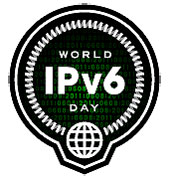Today, June 8, major organizations around the world are participating in World IPv6 Day, a 24-hour test run to try out a new, expanded version of the Internet. Fermilab is among the organizations that will participate in the event created by the Internet Society to promote a new version of the Internet protocol called IPv6. Fermilab Today published the following story about their role in today's global event.
The new Internet is coming and Fermilab wants to be ready.
Today the laboratory will take part in World IPv6 Day, a global effort to test out a new, expanded version of the Internet.
This new 24-hour event was created by the Internet Society to promote awareness of a new version of the Internet protocol called IPv6. Fermilab, along with Google, Facebook and other organizations that rely heavily on Internet usage, are actively participating by creating websites with IPv6 addresses and testing access to them.
“IPv6 represents the future of the Internet. Efforts are already under way to make sure we are ready for that future,” said the Computing Division’s Phil Demar, who is in charge of organizing Fermilab’s participation in IPv6 Day.
Computers and other networked devices use unique IP addresses to access the Internet. The older version of IP, called IPv4, uses a 32-bit address space, containing a familiar set of four 8-bit numbers (e.g. 131.225.103.37). IPv6 uses 128-bit address space. Its addresses are much longer and are represented with hexadecimal numbers (e.g. 2001:400:2410:50:3d8e:e20a:bf50:39e2). IPv6 websites look and behave like IPv4 websites. The IP address length will be the only noticeable change.
IPv4 supports about 4 billion possible addresses. The last blocks of free IPv4 addresses were assigned in February. The new IPv6 address format provides an octillion times the amount of existing IPv4 address space. Most computers purchased today are capable of using both IPv4 and IPv6 addresses.
Fermilab is currently working to ensure its public websites and email services will provide IPv6 accessibility by September 2012. The Computing Division plans to have IPv6 support for other laboratory computing systems by September 2014. A sample Web page is available for visitors to check if they have an IPv6 address for their computer or device.
For more information on World IPv6 day, please visit the official Internet Society website.







